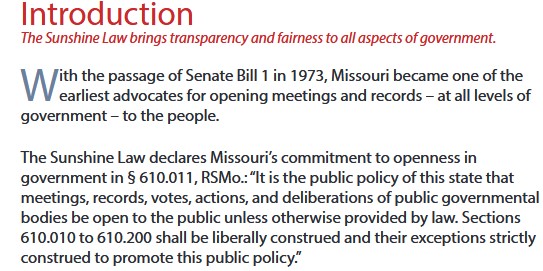That is the Question
[The above photo is the opening of the Missouri Attorney General's pamphlet explaining the Open Meetings Law in terms even school board members can understand (but maybe not their lawyers).]
The second item of major concern from this board meeting occurs at the 7:30 minute mark. An announcement was made concerning a change in “the process for board policies.” This is the process by which board policies (the policies that serve as the rules to govern the school) are introduced, amended, revised, or rescinded. Previously and appropriately, any such policy initiatives were introduced at a board meeting, discussed to one extent or another. More discussion and public input were invited at the second reading and the new/amended policy, revised per input and discussion was voted on in the third reading. This process is not formalized in the policy, but it is the standard parliamentary process for adoption by most legislative bodies and the one usually followed by boards.
The announcement at this meeting introduced a change to that process. Going forward, the initial introduction of policy would be afforded the board in a closed session. Public input would be allowed at the second reading during an open meeting, with the third reading being made pursuant to a vote to adopt. Board members were advised that the reason for this was because the board might decide that some proposed policies or policy changes might “not be what the board wanted for our school” and so we wouldn’t introduce those to the public. Members were also reminded of the “proper” way to recommend changes and shorten discussions at open meetings. Members ought to email their proposals for amendments/changes to the administration and/or board president for review.
Background: At the last board meeting, one recalcitrant member actually read the long list of policies being presented for enactment/revision. These were policy changes recommended by the MSBA, as is the usual case for policy adoption/revision. The normal process, of course, is to just accept these recommendations and so, most of the board members had not even read the proposals. The errant board member, though, proceeded to pull several of the policies out of the list to propose different wording, different policy, or rejection of the recommendation. So disturbing was this act to one member (who happens to be the new president of the MSBA) that she left the meeting at this point. The ensuing discussion also proved to be embarrassing, as it became evident most of the members had not read the proposals before coming ready and willing to vote on them, and the discussion ranged into some uncomfortable territory. It was clearly time to eliminate the threat of this happening again. The proposal to present the first reading to a closed session was so carefully worded as a good thing and so stealthily introduced that even the member who took the time to read and improve the last list of revisions stated that she thought it a good idea. It’s not. It’s an incredibly bad idea. Why?
First and foremost, it’s illegal. Missouri Open Meetings laws do not list generic items that can or must be talked about in open meeting (if talked about). Instead, they have a very short, very specific, very concise list of what is allowed to be decided or discussed in closed meetings. And the school board policy discussion is not on that list by any stretch of the law. The act of deciding in a closed meeting what part of the discussion you do or do not want the electorate to know you even discussed is illegal and opens the school to immense liability. It’s irresponsible and arrogant to mention in an open meeting that you intend to illegally close these discussions to the public.
As importantly, though, is a continued saga of an elite corps of public servants deciding outside the transparency of public meeting what might “not be for our school.” At some point, these public officials and school administrators have to wake up to the fact that it’s not “their school.” It’s yours.

